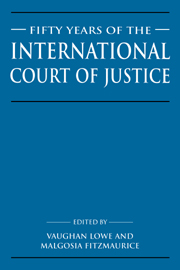Book contents
- Frontmatter
- Contents
- List of contributors
- Preface
- List of abbreviations
- Sir Robert Yewdall Jennings, by Vaughan Lowe
- List of publications of Sir Robert Jennings
- Table of cases
- Part I The International Court of Justice
- Part II The sources and evidences of international law
- Part III Substance of international law
- 10 The Court's role in relation to international organizations
- 11 Cases of the International Court of Justice relating to employment in international organizations
- 12 Jurisdiction and immunities
- 13 Adjudication as a mode of acquisition of territory?
- 14 Equitable maritime boundary delimitation
- 15 Environmental protection and the International Court of Justice
- 16 The contribution of the International Court of Justice to air law
- 17 The treatment of human rights and of aliens in the International Court of Justice
- 18 The International Court of Justice and the right of peoples to self-determination
- 19 The International Court of Justice and the peaceful settlement of disputes
- 20 The International Court of Justice and the use of force
- Part IV Procedural aspects of the work of the International Court of Justice
- Part V The International Court of Justice and the United Nations
- Index
18 - The International Court of Justice and the right of peoples to self-determination
Published online by Cambridge University Press: 02 November 2009
- Frontmatter
- Contents
- List of contributors
- Preface
- List of abbreviations
- Sir Robert Yewdall Jennings, by Vaughan Lowe
- List of publications of Sir Robert Jennings
- Table of cases
- Part I The International Court of Justice
- Part II The sources and evidences of international law
- Part III Substance of international law
- 10 The Court's role in relation to international organizations
- 11 Cases of the International Court of Justice relating to employment in international organizations
- 12 Jurisdiction and immunities
- 13 Adjudication as a mode of acquisition of territory?
- 14 Equitable maritime boundary delimitation
- 15 Environmental protection and the International Court of Justice
- 16 The contribution of the International Court of Justice to air law
- 17 The treatment of human rights and of aliens in the International Court of Justice
- 18 The International Court of Justice and the right of peoples to self-determination
- 19 The International Court of Justice and the peaceful settlement of disputes
- 20 The International Court of Justice and the use of force
- Part IV Procedural aspects of the work of the International Court of Justice
- Part V The International Court of Justice and the United Nations
- Index
Summary
1. No one can deny that self-determination has been one of the most important driving forces in the new international community. It has set in motion a restructuring and redefinition of the world community's basic ‘rules of the game’. At the same time, its ideological and political origins render selfdetermination a multifaceted but extremely ambiguous concept: a concept that is, at one and the same time, both boldly radical (in that it promotes democratic self-government, and free access of peoples to the role of international actors) and deeply subversive and disruptive (in that it undermines territorial integrity and may lead to the fragmentation of the international community into a myriad of national or ethnic entities, all poised to fight one another). Self-determination is also significant jurisprudentially. For one thing, its study enables us to inquire into the underlying tensions and contradictions of international relations as well as the interplay of law and politics on the world scene. For another, self-determination belongs to an area where states’ interests and views are so conflicting that states are unable to agree upon definite and specific standards of behaviour and must therefore be content with the loose formulation of very general guidelines or principles. Indeed, this is an area where it is easier for states to proclaim principles than distil hard-andfast rules: principles, being general, woolly and multifaceted, lend themselves to various and even contradictory applications; in addition, they are susceptible to being manipulated and used for conflicting purposes.
- Type
- Chapter
- Information
- Fifty Years of the International Court of JusticeEssays in Honour of Sir Robert Jennings, pp. 351 - 363Publisher: Cambridge University PressPrint publication year: 1996
- 4
- Cited by



